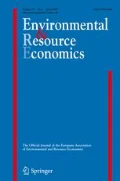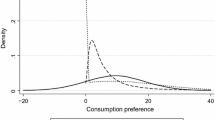Abstract
In repeated choice modelling studies, it is often the case that individuals always select the status quo option. Although this pattern may reflect considered choices, they may also be the result of alternative decisions about whether to participate in the choice process at all. Alternative methods of dealing with this behaviour, each with associated implications for estimates of economic values, are presented. In particular we consider the alternative strategies of excluding such individuals from the data, using hurdle models to explicitly model this group, and propose the use of latent class models to endogenously allow for different preference structures. An advantage of the latent class approach is that the form of the non-participation need not be defined in advance. These approaches are considered using UK choice experiment data on food choices where the attributes include genetic modification of food. The latent class approach reveals the presence of two forms of non-participation in the data.
Similar content being viewed by others
References
Akaike H (1973) Information theory and an extension of the maximum likelihood principle. In: Petrov BN, Csake F(eds) Second international symposium on information theory. Akademiai Kiado, Budapest, Hungary, pp 267–281
Ben-Akiva M, Swait J (1986) The Akaike likelihood ratio index. Transp Sci 20(2): 133–136
Boxall PC, Adamowicz WL (2002) Understanding heterogeneous preferences In random utility models: a latent class approach. Environ Resour Econ 23: 421–446
Bozdogan H (1987) Model-selection and Akaike’s information criterion (AIC): The general theory and its analytical extensions. Psychometrika 52: 345–370
Cairns J, van de Pol M, Lloyd A (2002) Decision making heuristics and the elicitation of preferences: being fast and frugal about the future. Health Econ 11: 655–658
Clark KA (2003) Nonparametric model discrimination in international relations. J Conflict Resolut 47(1): 72–93
Consumers Association (2002) GM dilemmas—consumers and genetically modified foods. Policy report, UK Which
Hensher DA (2006) How do respondents process stated choice experiments? Attribute consideration under varying information load. J Appl Economet 21(6): 861–878
Kahneman D, Tversky A (1984) Choice, values and frames. Am Psychol 39(4): 341–350
Lancsar E, Louviere JJ (2006) Deleting ‘irrational’ responses from discrete choice experiments: a case of investigating or imposing preferences?. Health Econ 15(8): 797–811
Marris C, Wynne B, Simmons P, Weldon S (2001) Public perceptions of agricultural biotechnologies in Europe. Final report of the PABE research project. http://www.pabe.net
MORI (2003) GM food opposition continues, 3 July 2003. http://www.mori.com/polls/2003/gmfood.shtml
Pollak RA, Wales TJ (1991) The likelihood dominance criterion: a new approach to model selection. J Econom 47(2–3): 227–242
Rekola M (2003) Lexicographic preferences in contingent valuation: a theoretical framework with illustrations. Land Econ 79(2): 277–291
Rigby D, Young T, Burton M (2004) Consumer willingness to pay to reduce GMOs in food and increase the robustness of GM labelling. Report to UK Dept of Environment, Food and Rural Affairs (DEFRA)
Rokeach (1968) Beliefs, attitudes, and values: a theory of organization and change. Jossey-Bass, San Francisco
Saelensminde K (2006) Causes and consequences of lexicographic choices in stated choice studies. Ecol Econ 59(3): 331–340
Schwarz G (1978) Estimating the dimension of a model. Ann Stat 6(2): 461–464
Swait J (2001) Choice set generation within the generalized extreme value family of discrete choice models. Transp Res Part B, pp 643–666
Swait J, Ben-Akiva M (1987) Empirical test of a constrained choice discrete model: mode choice in São Paulo, Brazil. Transp Res B 21B: 103–115
Swait J, Adamowicz W (2001) The influence of task complexity on consumer choice, a Latent class model of decision switching strategy. J Consumer Res 28: 135–148
Train (2003) Discrete choice methods with simulation. Cambridge University Press, NY
von Roger H, Roger H, Massey DM, Adamowicz W (2005) Serial non-participation in repeated discrete choice models. Am J Agric Econ 87(4): 1061–1076
Author information
Authors and Affiliations
Corresponding author
Additional information
This paper draws work commissioned by UK Department of Environment Food and Rural Affairs (DEFRA). The views presented in this paper are those of the authors alone and should not be regarded as those of DEFRA or of individuals within DEFRA.
Rights and permissions
About this article
Cite this article
Burton, M., Rigby, D. Hurdle and Latent Class Approaches to Serial Non-Participation in Choice Models. Environ Resource Econ 42, 211–226 (2009). https://doi.org/10.1007/s10640-008-9225-9
Received:
Accepted:
Published:
Issue Date:
DOI: https://doi.org/10.1007/s10640-008-9225-9




